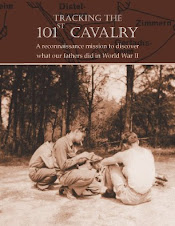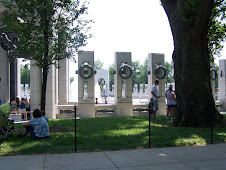In just three days we leave for Murnau, Germany, to celebrate the 70th anniversary of the liberation of a prisoner of war camp that held several thousand Polish officers during World War II. We will attend because, when that camp was liberated, my father was there.
Troop B, 116th Squadron, 101st Cavalry and Combat Command A of the 12th Armored Division of the 7th Army are officially recognized as liberating Oflag VII-A at 4:55 p.m., April 29, 1945. Members of Troop B were out in front of the 12th Armored Division, doing reconnaissance on the way to Austria. At around 3:00 in the afternoon, they approached the camp. As the Americans arrived from the north, a small group of SS were coming from the south. They met just outside the camp, and a fight erupted. Two members of the SS were killed, as prisoners climbed the fence and cheered on the Americans.
This commemoration feels as much like a reunion as anything else. Not everyone attending is a stranger to me--although we've never met in person. For example, Martin Lohmann, one of the organizers, and I have been emailing back and forth for more than a year, and Tom Wodzinski, whose father was a prisoner in the camp, sent me his father's story at least three years ago and is now helping get the names of all the prisoners listed on my website.
Most attendees probably will be the children and grandchildren of the Polish prisoners, but a few descendents of American soldiers will be there. As far as I know, no men from B Troop will attend--the youngest are now in their late 80s--but I continue to hope. I interviewed several members of B Troop--2nd Lt. Joseph Borkowski, Frederick Altizer, Charles Covey, Clinton Thompson, and Lou Gergley--and my memories of those conversations are precious. And I was lucky to also hear Roy Ramuar's and Charlie Kashuba's stories from their families.
I often wonder what my dad would think of all this. I like to think he'd be honored, but, knowing my dad, he'd be just as likely to say I was crazy for making a 5,000-mile trip to the other side of the globe for day of commemoration. He never discussed the war, so I can't say for sure how he would feel. But I'll take his photo, along with photos of other Troop B members, and, as we tour the camp and hear speakers talk about what happened in 1945, I will feel my father close to me. And that is worth a journey of any length.







